LessWrong Intro: I’m new to the LessWrong community, but was inspired to write this based on recent reading of The Sequences. It seems to me there’s a paradox to social progress that tends to undermine itself—societies making rapid ethical progress will (necessarily) become ashamed of their recent past and question their own legitimacy. Without awareness of this effect, it can undermine subsequent progress or influence such societies are willing to have in the world.
Humans are uniquely capable of self-reflection and learning from the past.
This capacity to change and grow over time also alters our perspective on our own previous actions, so that deeds and decisions that used to make us proud can later seem petty or unenlightened in light of newfound wisdom. Since we judge everything in relation to our present perspective, the more we progress, the less alignment we feel with our past selves in comparison.
We experience this as both individuals and as societies.
Individual Progress
For example, as a child, I once played a prank on a classmate by taping a pencil to his chair so that it would poke him in the butt when he sat down.
My friends were all laughing, and I thought I was hilarious.
After 30 years of learning, this isn’t exactly a moment I’m proud of. I mostly feel bad for the poor kid. I lacked empathy and prioritized getting a laugh over the well-being of another.
As individuals, we remember what it felt like to be our former, unenlightened selves. We can remember the confidence we once placed in bad ideas.
Comprehending our own transformation gives us a meta-perspective. We not only improve our values, our beliefs, our wisdom, but we develop an appreciation for the learning process itself. We develop practices—like reading, journaling, and meditation—to accelerate our learning. We acquire humility as we realize how often we’ve been wrong and how much more we have to learn.
We might think about this journey in terms of Position, Velocity, and Acceleration. Position describes where we are today, velocity describes how we’re changing, and acceleration is created by forces that increase our velocity, to speed up our learning.
Of course, not all forces create a positive acceleration of our learning. Diseases like Alzheimer’s can reverse our velocity, pushing our progress backwards. Ideological dogmatism might push us to actively resist new information. Alcoholism or unhealthy addictions might prevent us from progressing as quickly as we would otherwise. But for the most part, people move forward.
We might think about the forces that drive positive acceleration as engines and the forces that cause negative acceleration as brakes.
Small differences in acceleration make a massive difference in progress over time.
Collective Progress
Societies can also learn, but they don’t always do so. The same parameters for a society might look like this:
For individuals, the very process of growing and aging tends to be positive velocity, even without any accelerative forces like formal education or deliberate practice pushing us along. However, most progress accumulated by most individuals isn’t new—we spend a lot of time learning things that others already know, and not all new knowledge is shared with the collective.
Individual progress only leads to collective progress when an individual discovers something new and is able to spread it among the collective. Over time, societies have developed progress engines to do just that. Public services like libraries and education pool knowledge so individuals can learn more without direct trial and error. Enlightenment values like reason and science established better ways to understand the world and solve problems. Institutions like free speech and freedom of the press allow individuals to report new findings and critique collective consensus without the backing of those in power.
Not all societies have an effective progress engine. Often, those in power engage the brakes—tightly controlling the spread of information, promoting intolerance towards difference, repressing new ideas, or enforcing narratives—to reinforce a particular status quo. When the brakes overpower the progress engine, progress grinds to a halt.
An individual’s experience only reflects the most recent iteration of values and knowledge that a society has achieved. Since individuals in a society don’t personally experience the learning journey in its entirety, it’s more difficult to form a meta-perspective. We don’t remember what it felt like to be a less enlightened society, and it’s difficult to notice the mechanisms underlying the gradual progress of a society.
If that society doesn’t progress, one might look back through history and feel proud of how that society has consistently lived up to its values, because those values haven’t changed that much.
On the other hand, if a society has a strong progress engine, an individual is likely to look back in horror, because their updated position is relatively much more enlightened. They might come to believe that their society is irredeemably rotten and question its ability to have any positive impact in the world.
Collectives, unlike individuals, lack the direct experience of who they once were and how they evolved. If a society’s progress engine is working particularly effectively, progress goes exponential, and even the recent past feels barbaric in comparison.
Choose a Path
There are positive consequences of collective humility. It’s likely for the best when a population exposed to history loses the appetite for reckless military misadventures abroad. The progress engine is at work when individuals question the intentions of leaders, doubt the absolute moral rectitude of our justice, and identify pieces of society ripe for improvement.
However, there is a danger when a newly elevated generation—a product of the largest leaps of progress yet—can comprehend the gap between their values and those that came before, without understanding how they got there. Without a meta-perspective, the very institutions that were necessary and critical for our enlightenment become suspect. Without a meta-perspective, it’s easy to confuse pieces of the engine for dead weight.
It would seem that there are really only 2 options. We can be born into a society with a weak progress engine, be taught similar norms and values to the many generations who came before us, and feel pride and alignment in their actions. Or we can be born into a society with a strong progress engine, with vastly improved values compared to previous generations, and feel shame at their ethical shortcomings, unconscionable norms, and moral crimes.
This leaves us in a strange juxtaposition where societies at the pinnacle of human progress are the most ashamed and full of self-doubt.
For my part, I feel very fortunate to be in a society with such a strong progress engine that many individuals feel shame towards our past. I hope we continue to critique our culture and fix our flaws, without breaking the institutions that enabled such rapid progress.
Because at the end of the day, we are always exactly here:
We’re somewhere in the middle of the story, not at the end. Which means we still have work to do.
If we do our jobs right, the next generation will be very ashamed of us.
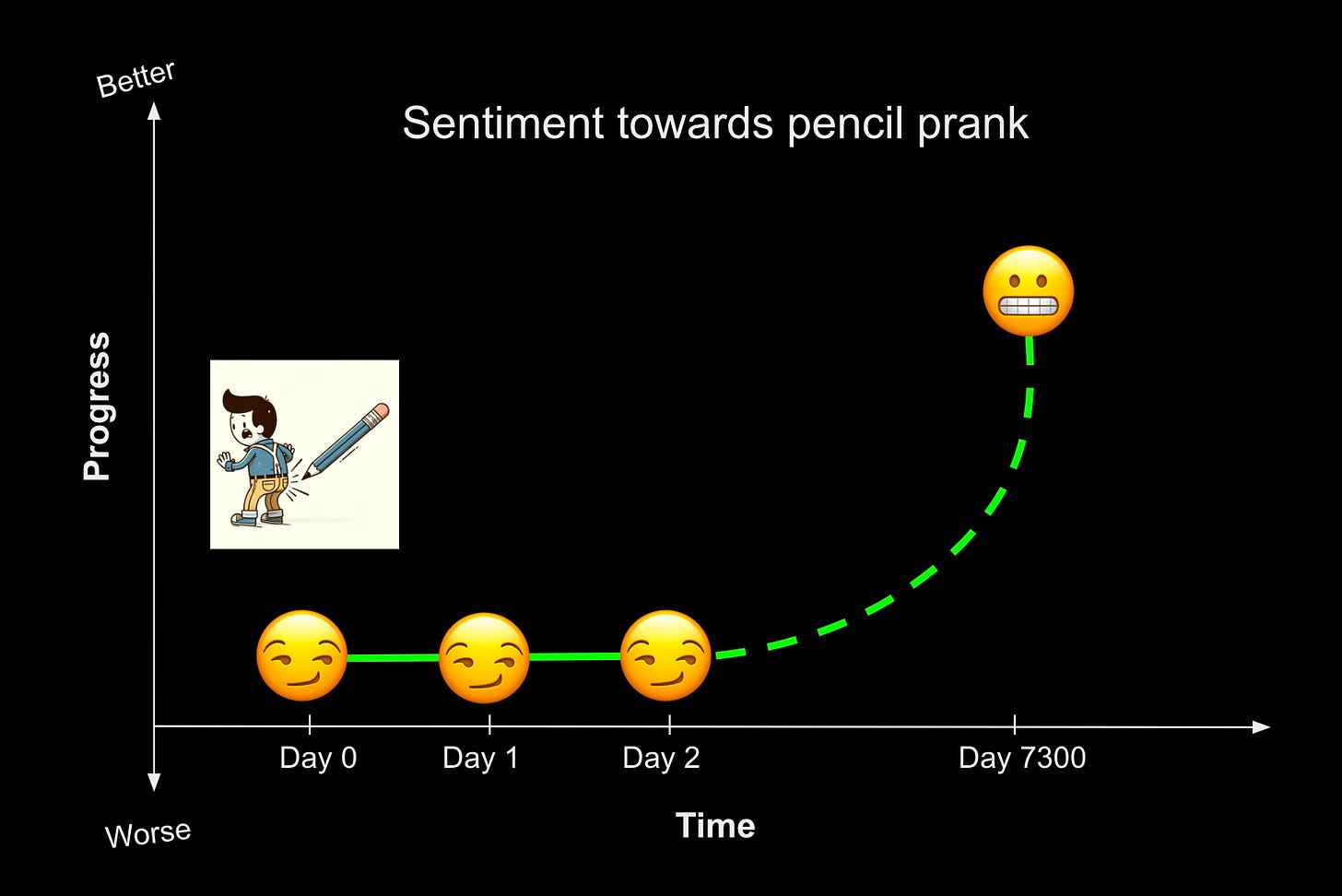
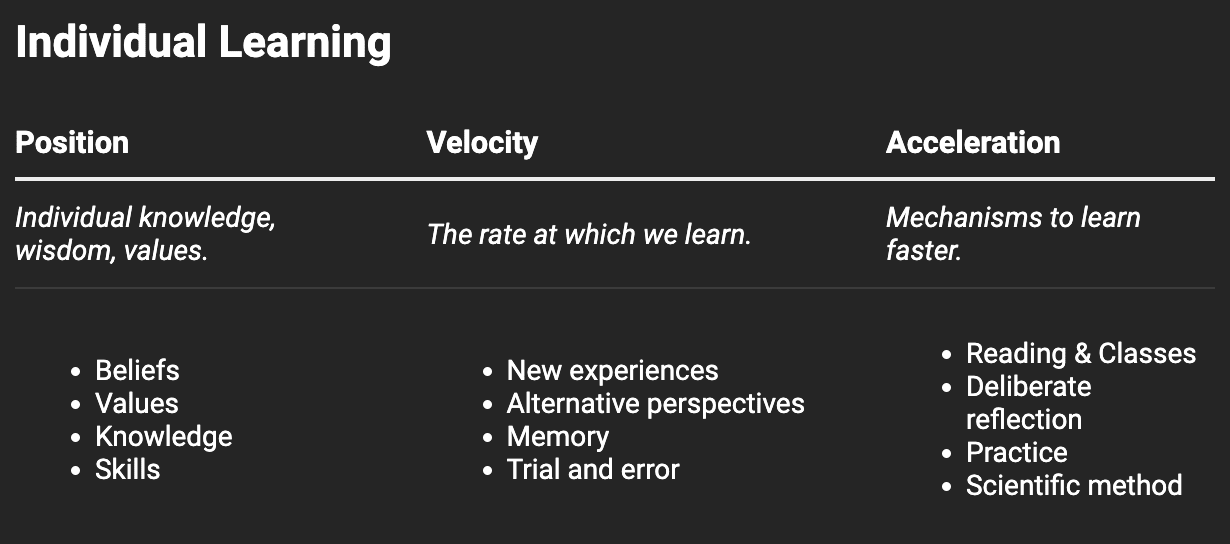
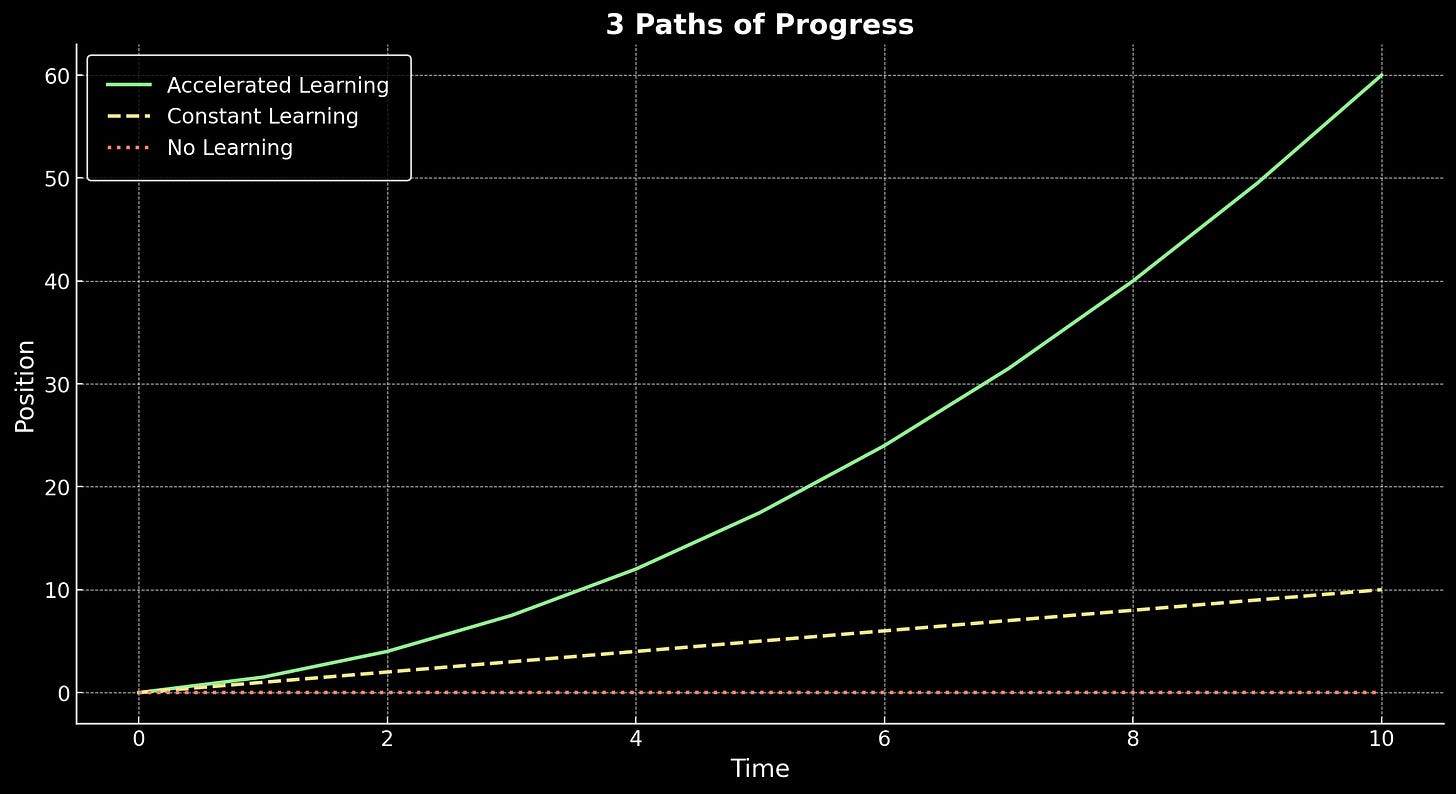
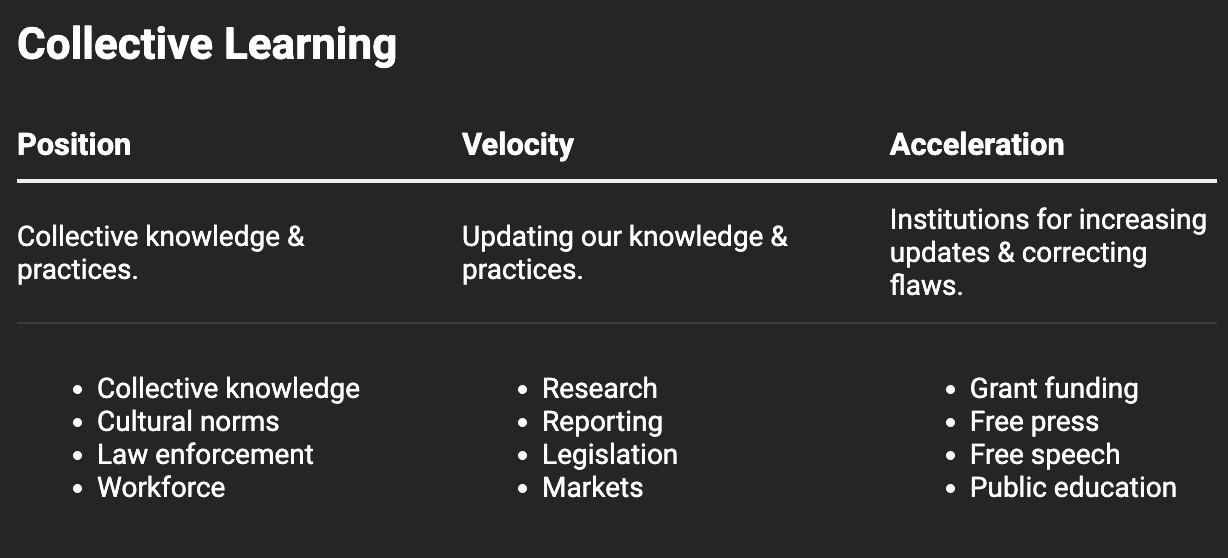
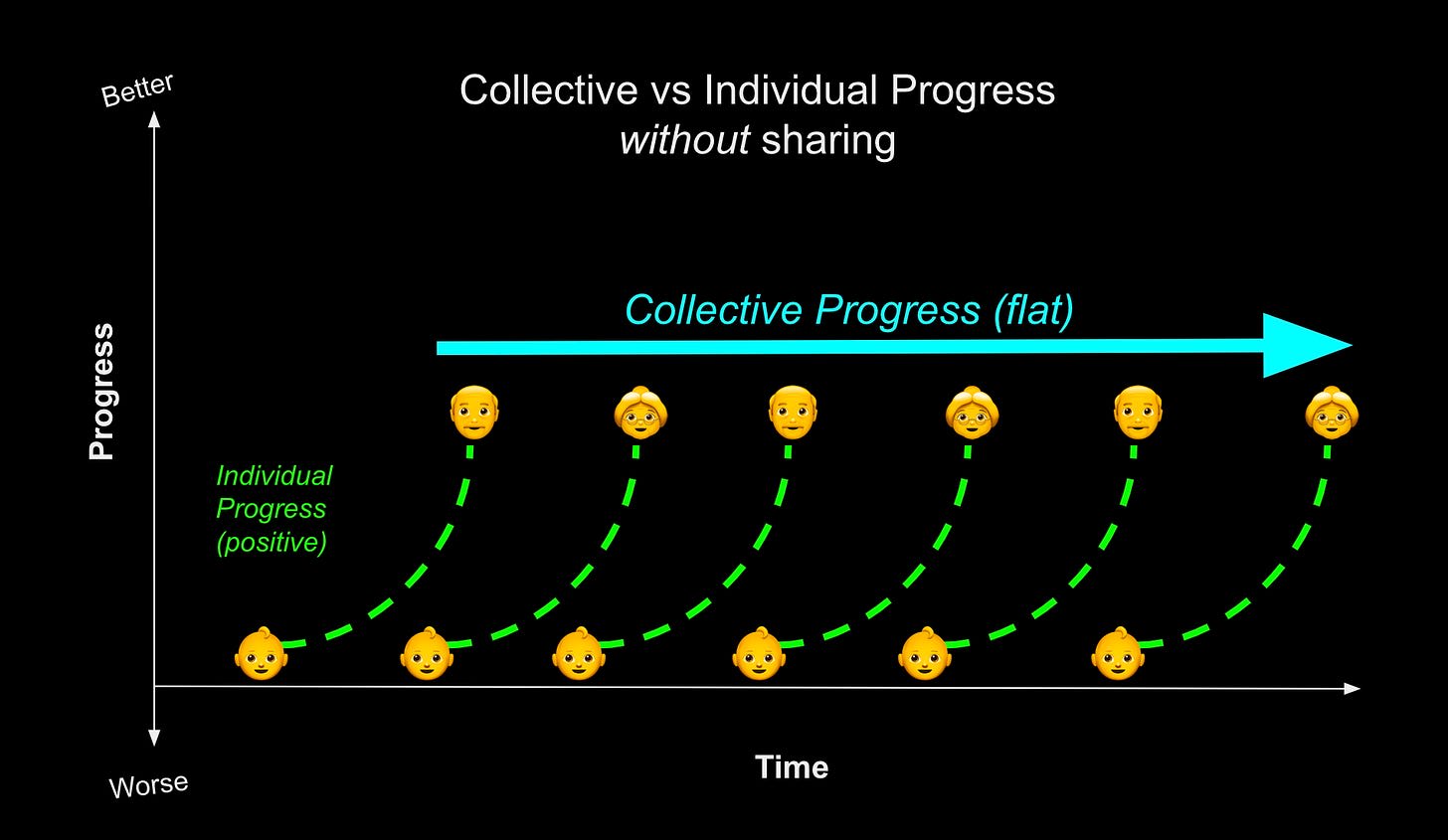
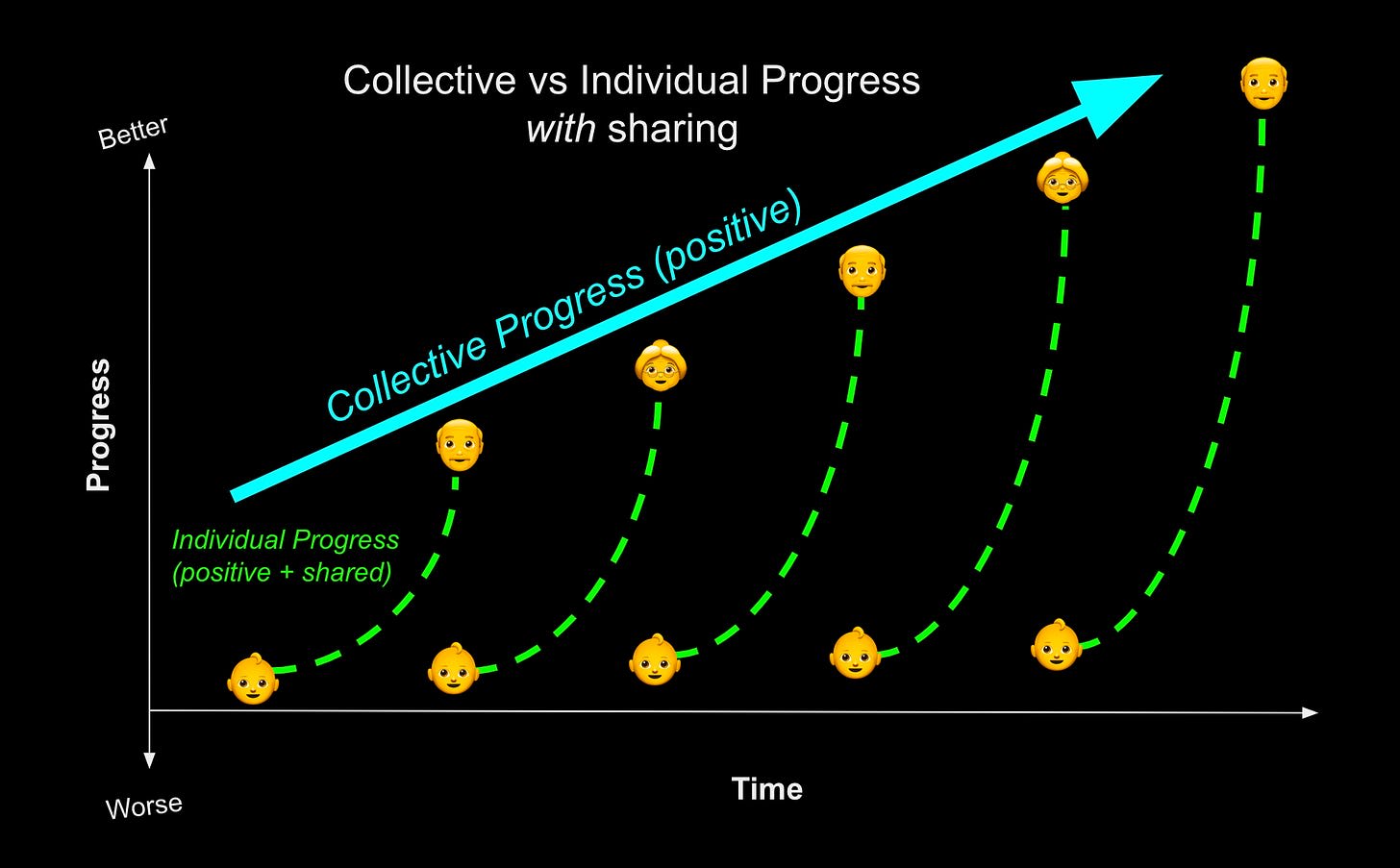
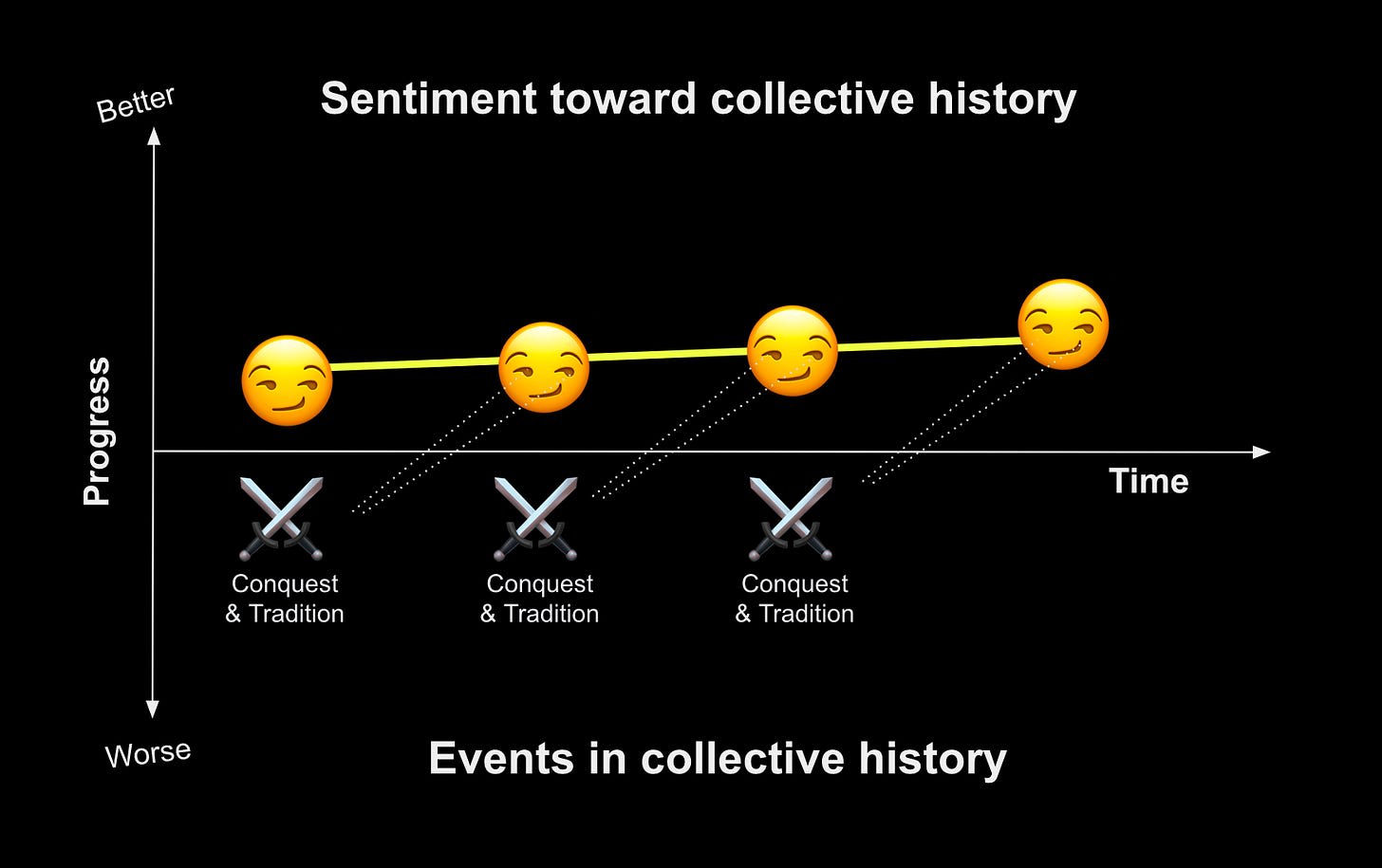
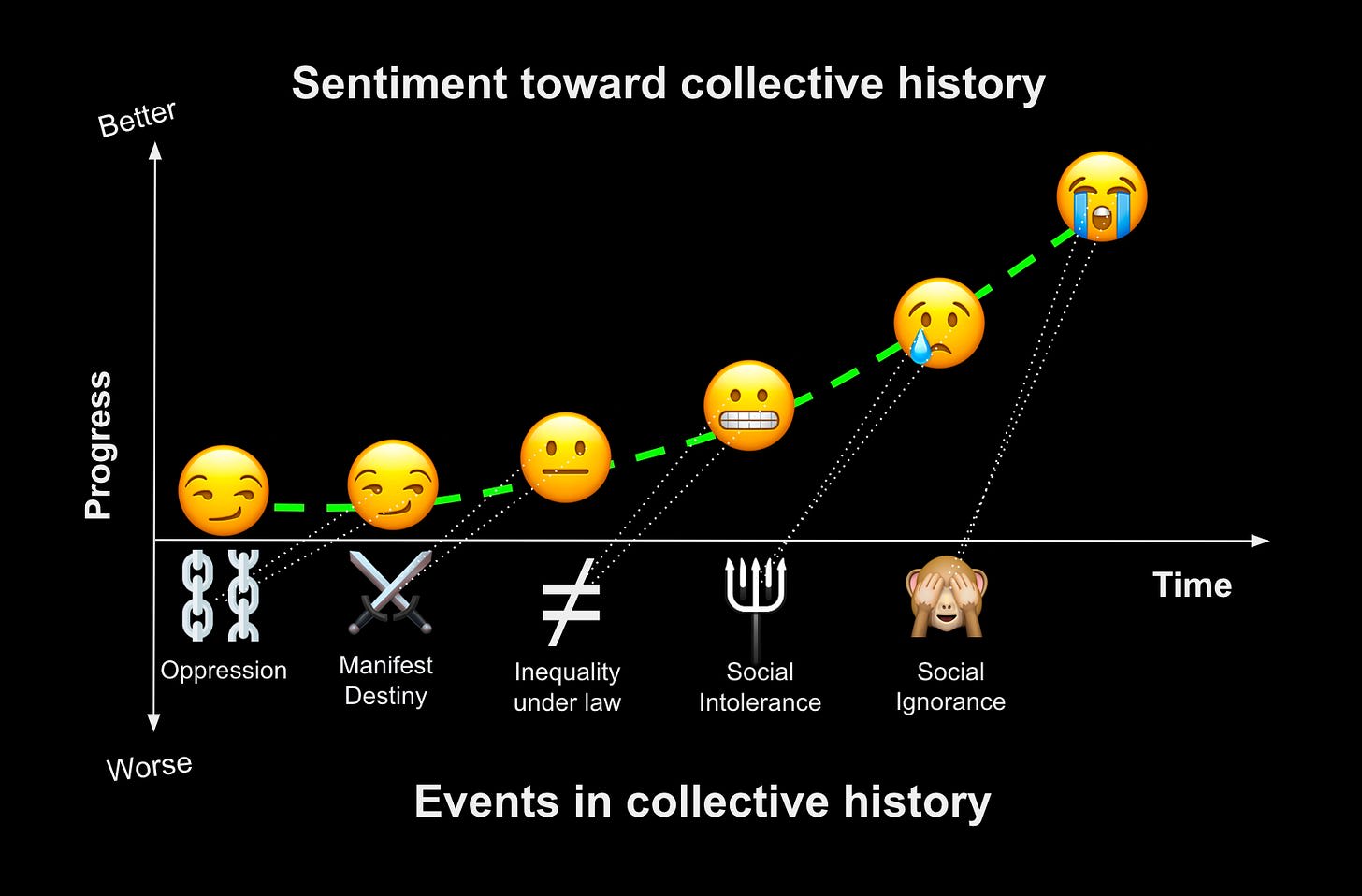
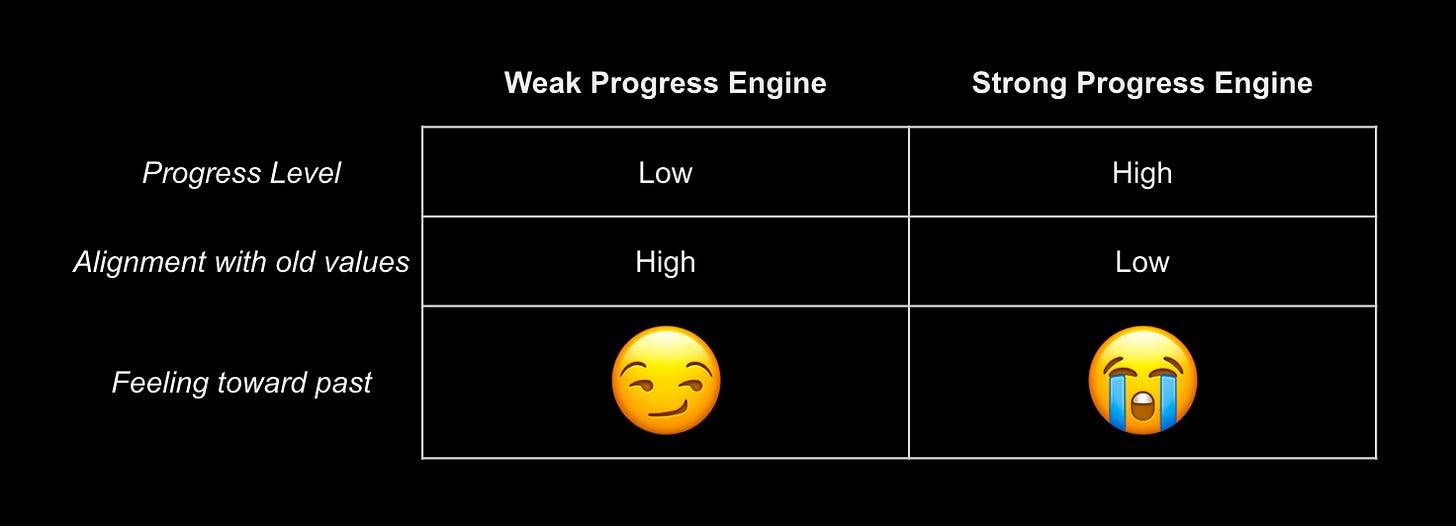
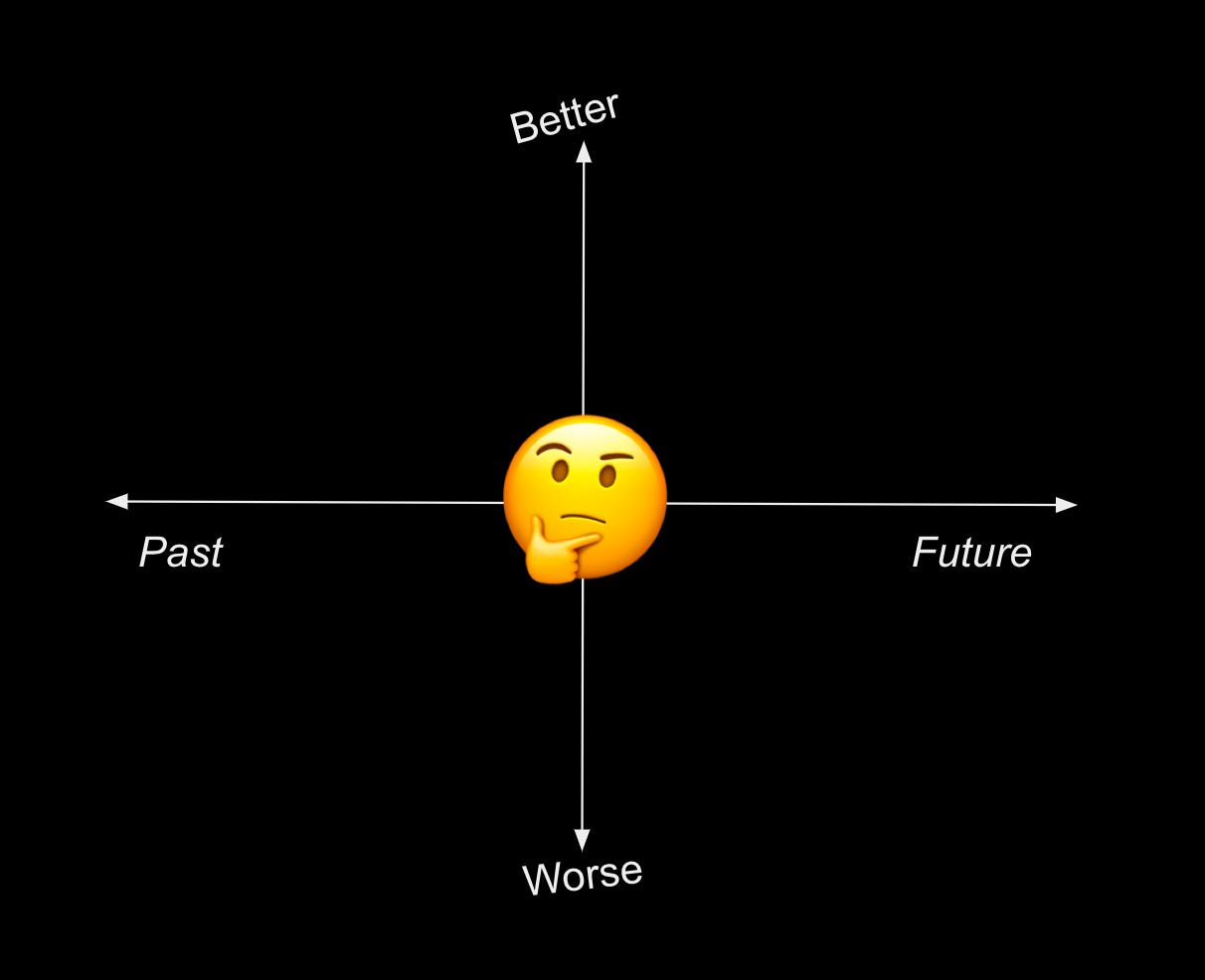
Societies making rapid ethical change will (necessarily) become ashamed of their recent past.
All ethical change feels like progress, because you think your current ethics are Good (that is what your current ethics are), and therefore all previous ethics are Bad in proportion to their deviation from the present.
Different kinds of shame. “My ancestors were weak… well, at least they somehow managed to survive and give birth to my glorious generation of warriors” feels different from “My ancestors were monsters”.
Another thing, making true or false statements about one’s ancestors is also a part of moral setup. Suppose the previous generation was “warriors who occasionally questioned whether fighting was the best thing they could do” and the current generation is “warriors who never question fighting and never question their ancestors”. There is a change, but the current generation would feel very good about the previous generation.
*
More generally, feeling bad about one’s past is not a symmetric difference. For example, from individual perspective, a good person would feel bad about having done bad things in the past, but a bad person would not necessarily feel bad about having done good things in the past. The change from “you care about what you did” and “you don’t give a fuck about what you did” feels qualitatively differently in different directions.
I have to disagree with some of the assumptions here. What I’m about to write is going to be unpopular though, since it goes against the social consensus (by which I mean that updating your belief towards mine will make you less liked on here rather than more). I’m going to comment anyway since I believe these common misconceptions might bring about the destruction of society.
What you’re seeing is not a rational paradox, it’s a psychological problem. Defining thing which are inherent to life as “problematic” and “bad” has the natural consequence of making us dislike life, reality, and ourselves, leading to positions like “having children is bad” and “humanity is a plague on the planet”. Going from enjoying pranks to suffering at the memory of them is not necessarily an improvement, since higher standards have made reality less enjoyable for you. You might argue that higher standards are for the purpose of human enjoyment, and that this is a paradox, but I think that’s the old philosophical idea about “being” vs “becoming”.
There’s no “collective progress” as such. All these things are relative rather than absolute. What you consider as desirable depends on who you are. I believe that a large portion of the population are now mentally unwell, and that the collective effort which seeks to change reality is partly rooted in illness, and thus leading to the same states that illness lead to. If somebody is afraid of words which envoke negative emotions in them, they might consider the censorship of such words to be ‘progress’, but this is merely a collective form of an individual in denial.
There’s nothing bad about tradition, it’s merely stability of some set of values which work. Of course you can come up with alternatives which sound better, but this is because anything is possible in thought. Comparing reality to fantasy scenarios will make reality seem “bad” by comparison, but I think it’s naive to assume that our ideals are realistic or even desirable (I might desire never to work again, but as a symptom of exhaustion or learned helplessness. But the root problem would not be work, but my stance towards it)
The consensus, not born from rationality but from common feelings and impressions, is that technology is good and war is bad. But the thing is that technology improves the fastest under conflict, and that any lack of conflict leads to stegnation (which is why monopolies are undesirable). My point is that the good/bad duality is naive, as ‘good things’ give birth to ‘bad things’ and vice versa.
Finally, it’s possible to avoid any “paradoxes” entirely. It’s possible for me to love myself while trying hard to improve. It’s also possible to compare the current state to a future goal state without suffering from the gap between them. The difference is in the mental framing and in your direction of comparison. Mathematically they might be equal under the duality principle in optimization, but cognitively it’s better to focus on positives than on eliminating negatives, and if the latter becomes pathological, the consequences are dire.